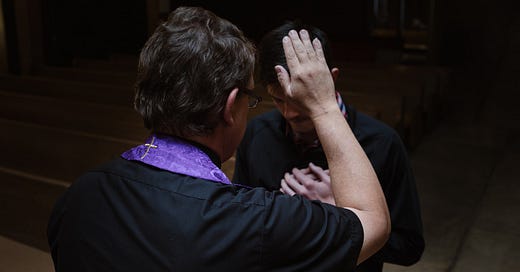In today’s Gospel, Jesus instructs his Apostles not to carry any money or extra clothes on their missionary preaching, but then says, “The laborer deserves his keep.” It’s basically a way of saying that they can earn a living spreading the Gospel, but they shouldn’t get rich.
Which is why I don’t require charge for these reflections.1 Some people still choose to pay for a subscription, for which I’m very grateful. I’m certainly not getting rich off these,2 but it’s more important than everyone has access to God’s grace, even if the medium is through a silly internet blog like mine.
If you can’t support financially, it also helps a lot is just sharing this Substack with a friend. There’s always a share link in every post, but today’s readings reminded me that I should explicitly ask every once in a while.
Thanks for reading, and thanks for sharing!
Reading 1
Gn 44:18-21, 23b-29; 45:1-5
Judah approached Joseph and said: "I beg you, my lord, let your servant speak earnestly to my lord, and do not become angry with your servant, for you are the equal of Pharaoh. My lord asked your servants, 'Have you a father, or another brother?'
So we said to my lord, 'We have an aged father, and a young brother, the child of his old age. This one's full brother is dead, and since he is the only one by that mother who is left, his father dotes on him.' Then you told your servants, 'Bring him down to me that my eyes may look on him. Unless your youngest brother comes back with you, you shall not come into my presence again.' When we returned to your servant our father, we reported to him the words of my lord.
"Later, our father told us to come back and buy some food for the family. So we reminded him, 'We cannot go down there; only if our youngest brother is with us can we go, for we may not see the man if our youngest brother is not with us.' Then your servant our father said to us, 'As you know, my wife bore me two sons. One of them, however, disappeared, and I had to conclude that he must have been torn to pieces by wild beasts; I have not seen him since. If you now take this one away from me, too, and some disaster befalls him, you will send my white head down to the nether world in grief.'"
Joseph could no longer control himself in the presence of all his attendants, so he cried out, "Have everyone withdraw from me!"
Thus no one else was about when he made himself known to his brothers. But his sobs were so loud that the Egyptians heard him, and so the news reached Pharaoh's palace. "I am Joseph," he said to his brothers. "Is my father still in good health?"
But his brothers could give him no answer, so dumbfounded were they at him. "Come closer to me," he told his brothers. When they had done so, he said: "I am your brother Joseph, whom you once sold into Egypt. But now do not be distressed, and do not reproach yourselves for having sold me here. It was really for the sake of saving lives that God sent me here ahead of you."
Judah is an important character in Genesis, not just etymologically,3 but narratively. He’s the one who suggests to the brothers that they sell Joseph rather than kill him, which sets off this whole story. He’s the one who convinces Jacob to let them take Benjamin back to Egypt.
And here, it’s Judah’s speech4 that convinces Joseph to reveal himself to his brothers. They didn’t recognize Joseph because he was speaking in a foreign language, wearing foreign clothes, and they hadn’t seen him since he was a teenager. They had no reason to even suspect a slave could become the Pharaoh’s regent.
And that’s how Joseph accepts Judah’s sincerity. He knows they genuinely regret their crime, and don’t want to further hurt their father Jacob. He reveals himself to them because he wants to reconcile with them, which is something they didn’t even realize was possible.
Responsorial Psalm
Ps 105:16-17, 18-19, 20-21
R. Remember the marvels the Lord has done.
When the LORD called down a famine on the land
and ruined the crop that sustained them,
He sent a man before them,
Joseph, sold as a slave.
R. Remember the marvels the Lord has done.
They had weighed him down with fetters,
and he was bound with chains,
Till his prediction came to pass
and the word of the LORD proved him true.
R. Remember the marvels the Lord has done.
The king sent and released him,
the ruler of the peoples set him free.
He made him lord of his house
and ruler of all his possessions.
R. Remember the marvels the Lord has done.
God didn’t forget Joseph, even when his brothers did. Joseph realizes this himself, at the end of the the first reading: “It was really for the sake of saving lives that God sent me here ahead of you.”
This whole psalm is about the history of Israel, from Abraham through Moses, written centuries later. That’s because it’s only in retrospect that we can really understand God’s plan.
At the end of every day, and most importantly at the endo of our lives, we should try to look back at the ways God’s plan was acted out, and how we cooperated (or not) in that plan.
Alleluia
Mk 1:15
R. Alleluia, alleluia.
The Kingdom of God is at hand:
repent and believe in the Gospel.
R. Alleluia, alleluia.
Joseph’s brothers repented, even though they had no idea Joseph could forgive them. How much more should we repent, knowing God is listening?
Gospel
Mt 10:7-15
Jesus said to his Apostles: "As you go, make this proclamation: 'The Kingdom of heaven is at hand.' Cure the sick, raise the dead, cleanse the lepers, drive out demons. Without cost you have received; without cost you are to give. Do not take gold or silver or copper for your belts; no sack for the journey, or a second tunic, or sandals, or walking stick. The laborer deserves his keep. Whatever town or village you enter, look for a worthy person in it, and stay there until you leave. As you enter a house, wish it peace. If the house is worthy, let your peace come upon it; if not, let your peace return to you. Whoever will not receive you or listen to your words—go outside that house or town and shake the dust from your feet. Amen, I say to you, it will be more tolerable for the land of Sodom and Gomorrah on the day of judgment than for that town."
The Apostles received the Gospel without doing anything to earn it, other than repent.5 That each is “worthy of his keep” just means he’s allowed to accept such gifts as are necessary to continue working (food, shelter, etc). They’re not supposed to get rich off it. Which is why priests and other religious take a vow of poverty, yet they’re provided for by the Church and parish.
Wishing a home “peace” isn’t meant to be an empty greeting, either. Jesus is granting the Apostles the power to cure the sick and raise the dead, so “peace be with you” doesn’t come with just a hearty handshake. The households must receive the peace offered them, just like we have to be open to receive God’s grace and mercy.
Also, I might lose my amateur status.
I’m not even getting minimum wage!
His name is where we get “Judea” and “Jew.”
The longest in Genesis, interestingly.
Thomas and Peter, just two examples, had to apologize to Jesus for doubts, while Judas never actually asked for forgiveness. That’s the real difference between his betrayal and the others’.




